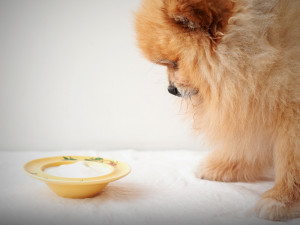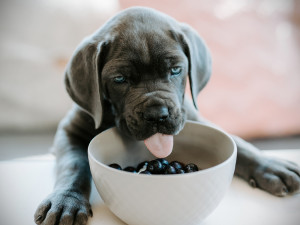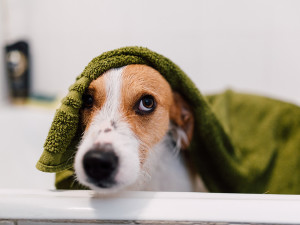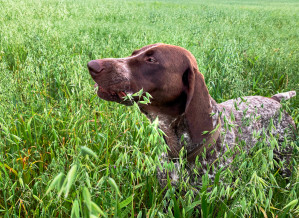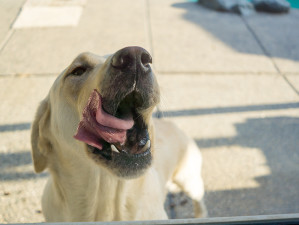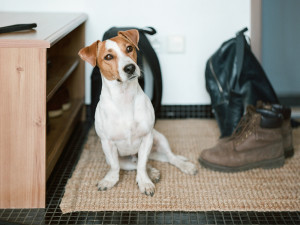Here’s Why Your Dog Farts So Much
Expert solutions for your pup’s flatulence
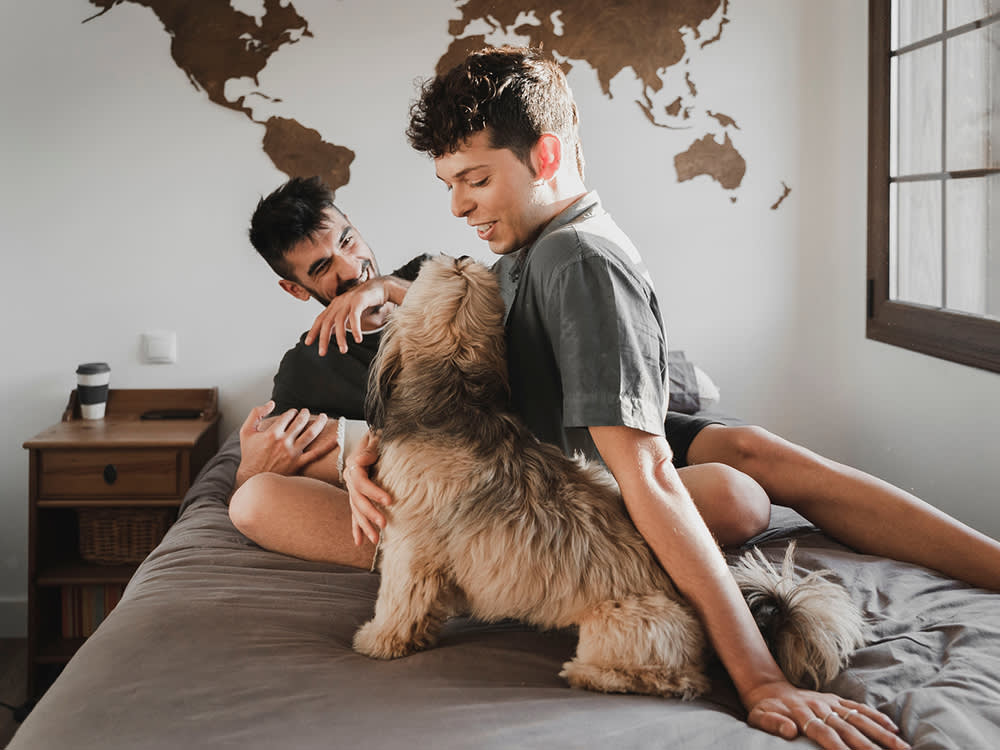
Share Article
There is a book called Walter the Farting Dog (2001), that is about as close to being non-fiction as a children’s picture book can get. It’s about a dog named Walter who farts so much that his dad wants to rehome him. (Actually, what? That plot is super problematic; forget about that book, and never rehome a dog for farting.) But the part about dogs farting is still 100 percent relatable.
As much as we might hate to admit it (and smell it), dog farts are a normal biological function in dogs – and humans, let’s be honest. Farts are the natural result of the surprising amount of air that is swallowed just with the simple act of eating. We explore why dogs fart so much and whether there’s anything you can do to reduce the stink.
Why does my dog fart so much?
Unfortunately for most pet parents, dog farts are rarely as adorable as the pups they come out of. But, contrary to popular belief, more than 99 percent of the gases that pass from the intestinal tract are odourless. When they do happen, dog farts are caused by an excess of gases in a dog’s intestinal tract. The gas might be produced in the biochemical process of digestion, gas diffusion from the bloodstream, gases produced by the bacteria that populate the intestinal tract or air that has been swallowed.
Excess swallowed air is a common cause of dog farts, and several factors can add to an increase in air intake. When dogs eat quickly, the amount of air swallowed tends to increase. That’s the reason why some dog breeds fart a lot. Brachycephalic breeds (dogs with a compressed upper jaw and a short muzzle) like Boston Terriers, French Bulldogs, Pugs and Boxers fart more than other dog breeds because they breathe more by mouth than by nose.
Is it normal for your dog to be farting so much? And what’s too much? Dog farts are a normal part of everyday life, but chronic flatulence and a house filled with stink aren’t the norm. If you notice a sudden increase in dog farts, or if your dog seems in pain, or they exhibit other symptoms such as vomiting, diarrhoea, bloating or weight loss, consult with your veterinarian.
What causes gas in dogs?
When determining why your dog is farting all the time, your vet will address your dog’s diet and rule out intestinal disease. Farting can be a symptom of other health issues, including infections, parasites, colitis and pancreatitis. Here are a few other medical issues that could cause an increase in farts:
inflammatory bowel disease (IBD)
irritable bowel syndrome (IBS)
antibiotic-responsive intestinal disorders
cancer
intestinal parasites
viral or bacterial inflammation of the intestines
food allergy or food intolerance
inadequate production of digestive enzymes by the pancreas
Another frequent source of dog farts is dietary fibre. Dietary fibre in pet food can cause a dog to fart as it is not easily digested by its own enzyme systems. Fibre is easily digested by the gas-producing bacteria that live in the colon. As fibre is broken down here, hydrogen sulphide is produced, which is the cause of the really stinky gases. Therefore, a diet that is heavy in fibre further promotes a ‘happy environment’ as well as ‘food’ for the bacteria, ultimately producing more gas and more farts.
Some ‘human foods’ may cause dogs to fart more, including legumes (such as soybeans, peas and beans), dairy products (such as milk and cheese), sweets (such as fruits and cookies), high-fat foods and spicy foods.
How to stop dog farts? Home remedies for gassy dogs
If there isn’t a severe medical issue causing your dog’s gas, your vet might determine that your dog’s diet is the problem. When altering your dog’s diet, make changes to their food slowly. Some easy home remedies for gassy dogs to help reduce excessive dog farting include:
feeding a mixture of dry and canned foods
discouraging rapid eating by placing an overturned small bowl inside the dog’s regular food bowl, preventing them from taking large mouthfuls
avoiding soy, soybeans, beans and peas in the diet
avoiding any treats containing milk, cheese or other dairy products with lactose
avoiding fresh or dried fruit treats
avoiding canned foods containing the texturing ingredient carrageenan
increasing activity: a sedentary lifestyle can increase the amount of gases produced as well as how long they ‘hang out’ in the digestive tract. Activity increases gastrointestinal motility, which in turn expels gas and increases regularity of bowel movements
Switch to a special diet for poor digestion
If simple remedies don’t ease your dog’s digestion issue, you might need to change their dog food altogether. The best dog food for reducing dog farts is a low-residue diet. A low-residue diet is designed to reduce the frequency and volume of stools, while prolonging transit time through the intestine. It is similar to a low-fibre diet but includes restrictions on foods that increase bowel activity.
Changing to a low-residue diet means that most of the nutrients of the food are digested and absorbed by the pet before they reach the colon, where the gas-forming bacteria live. Less food for the bacteria equals less bacteria, which equals less gas formed and less dog farts. Offering your dog a highly digestible diet is one of the major ways to combat flatulence.
Sometimes just going through a case and/or bag of such a low-residue diet solves the problem and the pet can return to regular food afterwards. If necessary, the therapeutic diet can become the pet’s regular food. Low-residue diets are available through your veterinarian, pet supply stores or can be cooked at home (boiled white rice, skinned chicken, cottage cheese and balanced with vitamins and minerals constitute low-residue ingredients).
Some medications and herbal supplements can reduce gas.
For excessive dog farts, sometimes medication can help. Although there are many products available, most are unfortunately not as helpful as they are touted to be, or not labelled for animal use. There are more than 30 herbal and botanical preparations available to reduce gas in the stomach and intestines; however, the dosage, safety and efficacy are unknown.
If further relief is needed, your vet may recommend that you give your dog these for gas:
Yucca schidigera supplementation: currently, this extract is labelled as a flavouring agent for pet food, but it is also available as an oral supplement. Several studiesopens in new tab have shown that it helps decrease the odour of farts.
Zinc acetate supplementation: zinc binds to sulphydryl compounds in flatulence, ultimately serving to deodorise the gasopens in new tab.
Non-absorbable antibiotics: such antibiotics kill the gas-forming bacteria of the colon and may be helpful as long as their use is not ongoing.
Do instant dog fart cures work?
If you’re looking for a quick fix for your dog’s foul-smelling gas, you might be inclined to try anything to get some relief. While these four commonly touted gas relief products are unlikely to be harmful, they won’t help much either. It’s better to find the source of your dog’s discomfort than to try to cover up the stench.
Probiotics
There are many ineffective probiotics being marketed for gas relief, so it is important to use one that has been shown to contain live cultures that withstand stomach digestion. It is unknown if this type of product will really help in reducing dog flatulence, as it is asking a great deal for these bacteria to survive the acid environment of the stomach, travel through the many feet of small intestines and finally reach the colon in the attempt to displace the gas-forming resident bacteria. Still, these are unlikely to be harmful, and can be beneficial in other ways outside of the realm of dog farts, such as helping to stabilise the intestinal microenvironment.
Activated charcoal tablets
These tablets are not likely to be effective because the charcoal-binding sites are filled on the journey from mouth to colon, so by the time the tablet gets to the gas-forming large bowel bacteria, it has essentially already been used up.
Simethicone
This product may control the volume of gas produced, but not the odour. It is an anti-foaming agent that reduces gas bubbles. This may be helpful at reducing our dog’s gas discomfort, but not the stench or whatever is causing it.
Pancreatic enzyme supplementation
It is unlikely that these extra digestive enzymes would help a pet in the absence of actual exocrine pancreatic insufficiency. Furthermore, this treatment is relatively expensive for something that may only be slightly helpful.
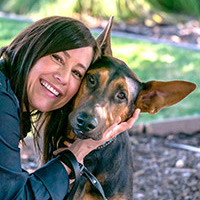
Dr. Shea Cox, DVM, CVPP, CHPV
Dr. Shea Cox is the founder of BluePearl Pet Hospice and is a global leader in animal hospice and palliative care. With a focus on technology, innovation and education, her efforts are changing the end-of-life landscape in veterinary medicine.
Related articles
![Dog standing in the bathtub covered with a green towel after a bath.]()
Step-by-Step Guide: Expressing Dog Anal Glands Safely & Effectively at Home
Yeah, it’s not exactly pleasant – but your pup will thank you
![Kurzhaar's dog eats grass, oats, happy puppy playing in the meadow]()
Why Do Dogs Eat Grass?
When to worry about your pup’s grass consumption (and when it’s not a problem)
![Labrador retriever licking their lips]()
Why Do Dogs Eat Poo?
What to do when your dog has questionable tastes
![Adorable dog sitting on a rug next to some boots scooting]()
The Post-Poo Scoot: Weird Things Dogs Do, Explained
Dog trainer Emma Bowdrey helps explain this common canine behaviour
![A black dog with a tilted head looks attentively at the camera while sitting in grass.]()
Is My Dog’s Poo Normal?
From bloody poo to diarrhoea – all your dog’s poo problems explained

